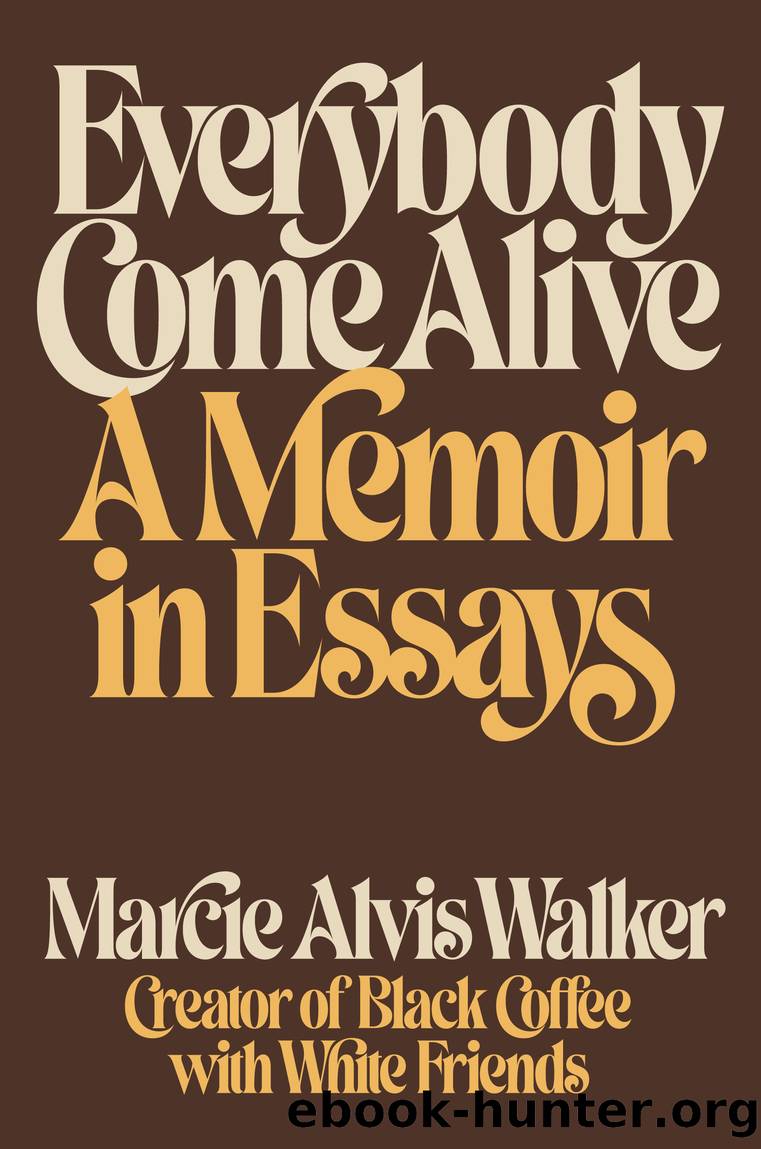Everybody Come Alive by Marcie Alvis Walker

Author:Marcie Alvis Walker [Alvis Walker, Marcie]
Language: eng
Format: epub
Publisher: The Crown Publishing Group
Published: 2023-05-30T00:00:00+00:00
I rebel at the notion that I canât be part of other groups, that I canât construct identities through elective affinity, that race must be the most important thing about meâ¦. Is that what I want on my gravestone: Here lies an African American? So Iâm divided. I want to be Black, to know Black, to luxuriate in whatever I might be calling Blackness at any particular timeâbut to do so in order to come out the other side, to experience a humanity that is neither colorless nor reducible to color.
Whenever I read this quote, I feel this fissure inside me. It aches to the touch like a hairline fracture in some secret bone that has grown inside the walls of my heart. If to some people the only way I and my child can be Black is to be at the lowest rung on the ratings, or to be Mammy, then fine. Let us stay Black. In fact, I want us to be as Black as rivers of indigo will allow us to be. I want us to be as Black as any slur of Negro, coon, and the n-word that I need to be if thatâs the price white supremacy charges me to keep my skin. Iâd choose for us to be their pickaninnies any day over our being supremacyâs white queens, with âAlways a Mammy, never a Scarlettâ tattooed on us, if need be.
When Hattie McDaniel accepted the role of Mammy in the movie, she was hotly criticized by Black audiences. The NAACP denounced the film, and many Black theaters wouldnât feature it. The Black community felt that the role of Mammy was just another racial slur disguised as a supporting character. The role of Mammy hit too close to home, yet also entirely missed the front door. At the time, Black people were just beginning to see themselves as more, and then, âThis again?â
But clearly Hattie McDaniel understood that she wasnât Dorothy Dandridge or Lena Horne. She knew how white America, from the church pulpit to the Supreme Court, saw her. Addressing her critics, McDaniel said, âIâd rather play a maid than be a maid,â and she would go on to be the first African Americanâmale or femaleâto win an Oscar.
In her acceptance speech, McDaniel said: âIt has made me feel very, very humble, and I shall always hold it as a beacon for anything I may be able to do in the future. I sincerely hope I shall always be a credit to my race and to the motion picture industry.â During the awards ceremony, she and her guest had to sit at a different âcolored onlyâ table. Later that evening, she had to stay at a âcolored onlyâ hotel. But she was there.
No matter how accurate the accusations about the stereotype she portrayed, McDaniel was at least willing to take that first punch. It would be another twenty-four years before Sidney Poitier became the second Black performer to win an Oscar. But first there was Mammy, because she and Uncle Tom were the only way white audiences would agree to see us.
Download
This site does not store any files on its server. We only index and link to content provided by other sites. Please contact the content providers to delete copyright contents if any and email us, we'll remove relevant links or contents immediately.
Down the Drain by Julia Fox(965)
The Light We Carry by Michelle Obama(881)
Cher by Cher(789)
Simple Passion by Annie Ernaux(735)
Love, Pamela by Pamela Anderson(594)
Zen Under Fire by Marianne Elliott(557)
The Nazis Knew My Name by Magda Hellinger & Maya Lee(542)
You're That Bitch by Bretman Rock(540)
Novelist as a Vocation by Haruki Murakami(530)
The Foxfire Book of Appalachian Women by Kami Ahrens(518)
Alone Together: Sailing Solo to Hawaii and Beyond by Christian Williams(518)
Kamala Harris by Chidanand Rajghatta(490)
Gambling Man by Lionel Barber(473)
The Barn by Wright Thompson(430)
Drinking Games by Sarah Levy(421)
Limitless by Mallory Weggemann(410)
A Renaissance of Our Own by Rachel E. Cargle(405)
Memoirs of an Indian Woman by Shudha Mazumdar Geraldine Hancock Forbes(403)
A new method to evaluate the dose-effect relationship of a TCM formula Gegen Qinlian Decoction: âFocusâ mode of integrated biomarkers by unknow(396)
